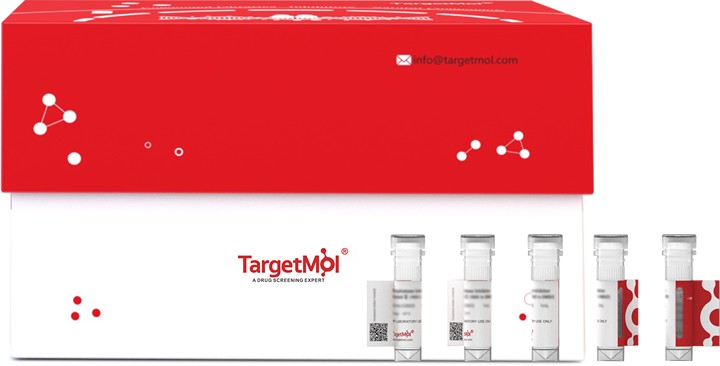METTL3 Protein, Human, Recombinant (His) is expressed in E. coli expression system with N-10xHis tag. The predicted molecular weight is 70.4 kDa and the accession number is Q86U44.

| パッケージサイズ | 在庫状況 | 単価(税別) |
|---|---|---|
| 20 μg | 約20 days | ¥ 65,500 |
| 100 μg | 約20 days | ¥ 123,500 |
| 1 mg | 約20 days | ¥ 528,000 |
| 説明 | METTL3 Protein, Human, Recombinant (His) is expressed in E. coli expression system with N-10xHis tag. The predicted molecular weight is 70.4 kDa and the accession number is Q86U44. |
| Species | Human |
| Expression Host | E. coli |
| Tag | N-10xHis |
| Accession Number | Q86U44 |
| Amino Acid | SDTWSSIQAHKKQLDSLRERLQRRRKQDSGHLDLRNPEAALSPTFRSDSPVPTAPTSGGPKPSTASAVPELATDPELEKKLLHHLSDLALTLPTDAVSICLAISTPDAPATQDGVESLLQKFAAQELIEVKRGLLQDDAHPTLVTYADHSKLSAMMGAVAEKKGPGEVAGTVTGQKRRAEQDSTTVAAFASSLVSGLNSSASEPAKEPAKKSRKHAASDVDLEIESLLNQQSTKEQQSKKVSQEILELLNTTTAKEQSIVEKFRSRGRAQVQEFCDYGTKEECMKASDADRPCRKLHFRRIINKHTDESLGDCSFLNTCFHMDTCKYVHYEIDACMDSEAPGSKDHTPSQELALTQSVGGDSSADRLFPPQWICCDIRYLDVSILGKFAVVMADPPWDIHMELPYGTLTDDEMRRLNIPVLQDDGFLFLWVTGRAMELGRECLNLWGYERVDEIIWVKTNQLQRIIRTGRTGHWLNHGKEHCLVGVKGNPQGFNQGLDCDVIVAEVRSTSHKPDEIYGMIERLSPGTRKIELFGRPHNVQPNWITLGNQLDGIHLLDPDVVARFKQRYPDGIISKPKNL |
| Construction | 2-580 aa |
| Protein Purity | > 90% as determined by SDS-PAGE. |
| 分子量 | 70.4 kDa (predicted) |
| Formulation | If the delivery form is liquid, the default storage buffer is Tris/PBS-based buffer, 5%-50% glycerol.If the delivery form is lyophilized powder, the buffer before lyophilization is Tris/PBS-based buffer, 6% Trehalose, pH 8.0. |
| Reconstitution | A Certificate of Analysis (CoA) containing reconstitution instructions is included with the products. Please refer to the CoA for detailed information. |
| Stability & Storage |
Lyophilized powders can be stably stored for over 12 months, while liquid products can be stored for 6-12 months at-80℃. For reconstituted protein solutions, the solution can be stored at -20°c to -80'c for at least 3 months. Please avoid multiple freeze-thaw cycles and store products in aliquots. |
| Shipping |
In general, Lyophilized powders are shipping with blue ice. Solutions are shipping with dry ice. |
| Research Background | The METTL3-METTL14 heterodimer forms a N6-methyltransferase complex that methylates adenosine residues at the N(6) position of some RNAs and regulates various processes such as the circadian clock, differentiation of embryonic and hematopoietic stem cells, cortical neurogenesis, response to DNA damage, differentiation of T-cells and primary miRNA processing. In the heterodimer formed with METTL14, METTL3 constitutes the catalytic core. N6-methyladenosine (m6A), which takes place at the 5'-[AG]GAC-3' consensus sites of some mRNAs, plays a role in mRNA stability, processing, translation efficiency and editing. M6A acts as a key regulator of mRNA stability: methylation is completed upon the release of mRNA into the nucleoplasm and promotes mRNA destabilization and degradation. In embryonic stem cells (ESCs), m6A methylation of mRNAs encoding key naive pluripotency-promoting transcripts results in transcript destabilization, promoting differentiation of ESCs. M6A regulates the length of the circadian clock: acts as an early pace-setter in the circadian loop by putting mRNA production on a fast-track for facilitating nuclear processing, thereby providing an early point of control in setting the dynamics of the feedback loop. M6A also regulates circadian regulation of hepatic lipid metabolism. M6A regulates spermatogonial differentiation and meiosis and is essential for male fertility and spermatogenesis. Also required for oogenesis. Involved in the response to DNA damage: in response to ultraviolet irradiation, METTL3 rapidly catalyzes the formation of m6A on poly(A) transcripts at DNA damage sites, leading to the recruitment of POLK to DNA damage sites. M6A is also required for T-cell homeostasis and differentiation: m6A methylation of transcripts of SOCS family members (SOCS1, SOCS3 and CISH) in naive T-cells promotes mRNA destabilization and degradation, promoting T-cell differentiation. Inhibits the type I interferon response by mediating m6A methylation of IFNB. M6A also takes place in other RNA molecules, such as primary miRNA (pri-miRNAs). Mediates m6A methylation of Xist RNA, thereby participating in random X inactivation: m6A methylation of Xist leads to target YTHDC1 reader on Xist and promote transcription repression activity of Xist. M6A also regulates cortical neurogenesis: m6A methylation of transcripts related to transcription factors, neural stem cells, the cell cycle and neuronal differentiation during brain development promotes their destabilization and decay, promoting differentiation of radial glial cells. METTL3 mediates methylation of pri-miRNAs, marking them for recognition and processing by DGCR8. Acts as a positive regulator of mRNA translation independently of the methyltransferase activity: promotes translation by interacting with the translation initiation machinery in the cytoplasm. Its overexpression in a number of cancer cells suggests that it may participate in cancer cell proliferation by promoting mRNA translation. During human coronorivus SARS-CoV-2 infection, adds m6A modifications in SARS-CoV-2 RNA leading to decreased DDX58/RIG-I binding and subsequently dampening the sensing and activation of innate immune responses. |
bottom
Please read the User Guide of Recombinant Proteins for more specific information.
recombinant recombinant-proteins proteins protein
